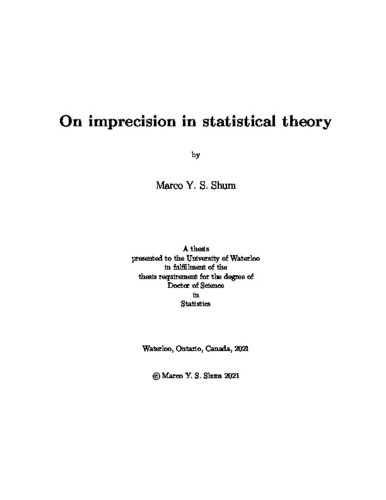| dc.description.abstract | This thesis provides an exploration of the interplay between imprecise probability and statistics. Mathematically, one may summarise this relationship as how (Bayesian) sensitivity analysis involving a set of (prior) models can be done in relation to the notion of coherence in the sense of de Finetti [32], Williams [84] and, more recently, Walley [81]. This thesis
explores how imprecise probability can be applied to foundational statistical problems.
The contributions of this thesis are three folds. In Chapter 1, we illustrate and motivate the need for imprecise models due to certain inherent limitations of elicitation of a statistical model. In Chapter 2, we provide a primer of imprecise probability aimed at the statistics audience along with illustrative statistical examples and results that highlight salient behaviours of imprecise models from the the statistical perspective.
In the second part of the thesis (Chapters 3, 4, 5), we consider the statistical application of the imprecise Dirichlet model (IDM), an established model in imprecise probability. In particular, the posterior inference for log-odds statistics under sparse contingency tables, the development and use of imprecise interval estimates via quantile intervals over a set of
distributions and the geometry of the optimisation problem over a set of distributions are studied. Some of these applications require extensions of Walley’s existing framework, and are presented as part of our contribution.
The third part of the thesis (Chapters 6, 7) departs from the IDM parametric assumption and instead focuses on posterior inference using imprecise models in a finite dimensional setting when the lower bound of the probability of the data over a set of elicited priors is zero. This setting generalises the problem of zero marginal probability in Bayesian
analysis. In Chapter 6, we explore the methodology, behaviour and interpretability of the posterior inference under two established models in imprecise probability: the vacuous and regular extensions. In Chapter 7, we note that these extensions are in fact extremes in imprecision, the variability of an inference over the elicited set of probability distributions.
Then we consider extensions which are of intermediate levels of imprecision, and discuss their elicitation and assessment. | en |

